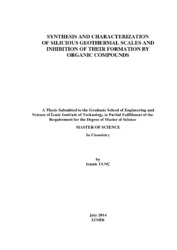Please use this identifier to cite or link to this item:
https://hdl.handle.net/11147/4166Full metadata record
| DC Field | Value | Language |
|---|---|---|
| dc.contributor.advisor | Demir, Mustafa Muammer | |
| dc.contributor.author | Tunç, Irmak | - |
| dc.date.accessioned | 2014-11-17T08:48:53Z | |
| dc.date.available | 2014-11-17T08:48:53Z | |
| dc.date.issued | 2014 | |
| dc.identifier.uri | http://hdl.handle.net/11147/4166 | |
| dc.description | Thesis (Master)--İzmir Institute of Technology, Chemistry, İzmir, 2014 | en_US |
| dc.description | Includes bibliographical references | en_US |
| dc.description | Text in English; Abstract: Turkish and English | en_US |
| dc.description.abstract | Geothermal energy is the thermal energy generated and stored in the earth and geothermal source, provides most reliable, sustainable, cost effective and environmentally friendly method among other energy sources. However, silicate scale deposits such as metal-silicate compounds present important challenges for geothermal energy fields. While the mineral-rich ground water comes to surface, due to the decrease in pressure, acidity and temperature the solubility of silicon and minerals in water decrease and precipitation occurs. In geothermal systems, a layer forms because of the precipitation at the inner surface of pipes. This layer is called scale or deposit. Eventually, the diameter of the pipe decreases upon the occupation of scales in the pipe, therefore the efficiency of electricity production reduces. In this study, artificial scale was created to test inhibitors in the laboratory. For this, the structure of the scale formed in the geothermal fields was analyzed and it was synthesized in laboratory. Then, method was optimized to determine the substances which can act as inhibitor. Later, the effectiveness of the substances which may act on the metal-silicate formation was tested. Polyacrylamide, Poly(acrylamide-co-diallyl dimethyl amonium chloride), Polyvinylpyrrolidone, Polyacrylicacid was tried at differen dosage and for different reaction time. Polyacrylicacid provides remarkable inhibition efficiency at low dosage. At 60 ppm dosage level, ~180 ppm increase is seen at soluble silica level. As a result of these tests, a new inhibitor or dispersant can be developed based on the molecular structure of effective inhibitors. | en_US |
| dc.language.iso | en | en_US |
| dc.publisher | Izmir Institute of Technology | en_US |
| dc.rights | info:eu-repo/semantics/openAccess | en_US |
| dc.subject | Geothermal scale | en_US |
| dc.subject | Organic compounds | en_US |
| dc.title | Synthesis and characterization of silicious geothermal scales and inhibition of their formation by organic compounds | en_US |
| dc.title.alternative | Silisyum zengin jeotermal kabuğun sentezi, karakterizasyonu ve oluşumunun organik bileşiklerle engellenmesi | en_US |
| dc.type | Master Thesis | en_US |
| dc.institutionauthor | Tunç, Irmak | - |
| dc.department | Thesis (Master)--İzmir Institute of Technology, Chemistry | en_US |
| dc.relation.publicationcategory | Tez | en_US |
| item.languageiso639-1 | en | - |
| item.fulltext | With Fulltext | - |
| item.openairecristype | http://purl.org/coar/resource_type/c_18cf | - |
| item.openairetype | Master Thesis | - |
| item.grantfulltext | open | - |
| item.cerifentitytype | Publications | - |
| Appears in Collections: | Master Degree / Yüksek Lisans Tezleri | |
Files in This Item:
| File | Description | Size | Format | |
|---|---|---|---|---|
| 10045715.pdf | MasterThesis | 1.95 MB | Adobe PDF |  View/Open |
CORE Recommender
Page view(s)
67,720
checked on Jul 22, 2024
Download(s)
56
checked on Jul 22, 2024
Google ScholarTM
Check
Items in GCRIS Repository are protected by copyright, with all rights reserved, unless otherwise indicated.